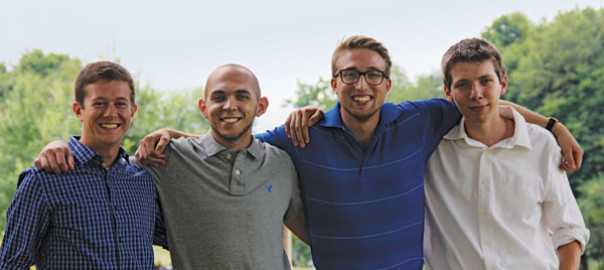Bishop David Zubik wants to fully prepare men for the priesthood of the future, and donors to Our Campaign for The Church Alive! are playing an important role in that effort.
With the graduate-level seminary program extended to five years, adding a “pastoral year” in parishes, the non-profit board of the campaign has approved a grant to provide for Days of Recollection for seminarians to reflect on their parish experiences.
The funds come from sacrificial gifts of donors representing about 130,000 faithful of the diocese.
“I’ve just met with the five seminarians who will take part in this first pastoral year starting in June, and there is a sense of excitement,” said Father Brian Welding, rector of St. Paul Seminary in Crafton and director of the department for pre-ordination formation. “We want them to understand what the priestly life is like in the parish as they shepherd, teach and sanctify.”
Working with pastors who are experienced mentors, the seminarians will assist at Masses, take Communion to the homebound, go on hospital visits, and help prepare couples for marriage. They also will develop an adult religious education program, teach faith formation, and participate in RCIA, youth ministry and parish charitable work.
The days of recollection will help them reflect on their ministry as they contemplate the works of the spiritual masters and support one another.
“Our priests need to make time for themselves. Unless they have intentional stepping-aside time, it’s easy to forget the ‘for what’ dimension of the priesthood,” said Susan Muto, Ph.D., co-founder of Epiphany Academy of Formative Spirituality in Pittsburgh, who will help lead the program.
“The depth of a priest’s spiritual life literally speaks volumes to the people,” Muto said. “There is no way he can help them unless he understands the crosses they are carrying, what shapes and forms their lives.”
Father Nick Vaskov, vice-rector of the seminary and director of pastoral formation, is in charge of the pastoral year program.
“In order to be an effective leader and shepherd God’s people, a priest must prepare his heart,” Father Vaskov said. “During the pastoral year the seminarians will need time to put everything into focus, to process what they’re experiencing. The days of recollection should help.”
Until now, studies for the priesthood in the Diocese of Pittsburgh have included two-to-four years of undergraduate philosophy, pre-theology and spiritual formation at St. Paul Seminary. This is followed by an additional four years of graduate-level theology at seminaries outside the diocese, with a summer in a parish. Those who study at the Pontifical North American College in Rome also complete a fifth year of studies after they are ordained to the priesthood.
“Formation of priests is an important aspect at St. Paul’s and all theological schools,” Father Welding said. “The four pillars of priestly formation—human, spiritual, intellectual, and pastoral—help develop men of compassion and concern for others.”
“Hunger in the average pew has reached epidemic proportions,” Muto said. “People are starving for spirituality and need to know they will be fed. Our seminarians will draw water from the well of salvation and be restored through prayer, quiet time and fellowship.”
“As they return to their classes, they can connect back to their pastoral year,” Father Vaskov said. “This should help them understand what lies behind the practical part of their studies.”

